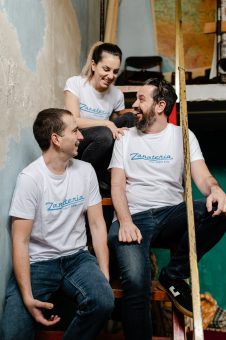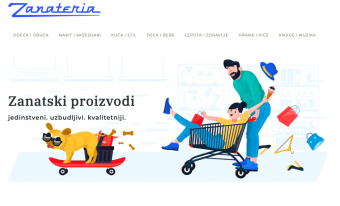From Vermont to Belgrade, from wedding bands to over a thousand products, from piling up identical items on shop shelves to unique pieces made with love and care, from goods no one buys to care for the environment, customers and to artists – this is how Zanateria was created, the first online department store with products handmade in Serbia.
Married couple Milica Stankovic Scepanovic and Aleksandar Scepanovic, aided by knowledge of their friend Ivan Gacesa, an IT entrepreneur, they designed something completely new in Serbian market – a virtual department store where small producers have the opportunity to show the result of their skill and customers have the privilege of getting a product that is unique, carefully designed and completely meeting their wish. As they are users of handmade pieces themselves, and while waiting for the opportunity to the numerous independent manufacturers to also show up in Serbia, they decided to take the charge and set up a craft store Zanateria.

Milica, Aleksandar and Ivan were previously drawn by hand-made products. Realising how difficult it is for people of modern times to get to craftsmen, as well as it is for the latter to get to the market, they decided that they themselves would be the bearers of change. The idea came up during Aleksandar and Milica’s trip to the United States and visit to the craft department store that left a strong impression. Even wedding bands were ordered online. “When the wedding bands arrived with personal dedication from the masters who made them, it clicked. We decided to make a virtual craft department store online upon our return to Serbia,” Aleksandar explains. Ivan joined them and so this story began, a story of a trade where everyone gains profit – both creators, buyers and nature.
In addition to being a resource-saving virtual store, while being deprived of all the infrastructure needed for mass production and consumption, Zanateria provides even one more convenience for both customers and the planet. Namely, the products can be tested and ordered, so there is no risk of accumulation and destruction of unsold goods, which is often the case with large companies due to the lack of discounts for fear of “damaging” the brand. “That manner that makes the brands more important than the common good and natural resources, is very dangerous, but we get the impression that more and more people are ‘waking up’ and realise that rapid and big changes are necessary in production, but also in the way of spending, if we want to save ourselves. And just the example of small manufacturers shows us that brands can also be built by caring for the environment”, says Aleksandar.
Considering the rhythm of life, which is becoming faster globally, and being aware that most people are familiar with the problems of mass production but without enough time or will to look for alternative options, from the beginning, they have designated this as one of the most important missions of their business – to offer shortcuts in that pursuit.
Zanateria is focused on healthy products made of natural and eco-friendly materials, which retail shopping allows. Environmental care and ecological approach in the process of making and packaging products is very important for the community that Zanateria brings together. Plus, complete bypassing consumerism, offering products that are not consumed quickly, but are cherished and loved, often whole life, and encouraging manufacturers to make market changes, Zanateria upholds the principles of circular economy. The development of the industry has hindered the former popularity of small local craftsmen and vendors. Now, it is a big challenge for small manufacturers to compete with huge companies. Mass production and global economy, on the other hand, do not allow much care about harmful effects on the environment. In doing so, the question of labor exploitation and workers’ rights imposes itself. “Zanaterians” are very shaky when it comes to this sensitive topic. As Aleksandar says, every responsible man must know that by buying cheap ‘garbage’ he becomes an accomplice to the big exploitative corporations and bears a part of the responsibility for the exploitation of children and the workforce in general, for inhumane working conditions, poverty in third-world countries and for the dire environmental consequences which product surpluses, their composition, shorter life span and mode of production they cause.
In focus:
The so-called small producers do not enter distribution chains due to the small volume of production and the high cost of entry, as well as the necessity of compromise quality that they nurture and low prices in the market. This is why Zanateria offers them the opportunity to make their goods accessible and representative for a large number of people. “An economy with a human face”, by which the Zanateria platform is trying to enhance the Serbian market, offers an opportunity to buy the product from the man who made it by himself and therefore he personally guarantees for its quality, as well as making sure that the money goes directly to the creator.

Guided by Dusko Radovic’s message that “the one who wants change the world should start from his dripping/leaking TAP”, they decided to start a change in their microcosmos. So they have come up with a platform that empowers a healthy approach to economy and consumption, saves resources, opposes domination of “harsh transitional capitalism” and at the same time allows that everything is just a click away from buyers. The first phase of this work involves bringing together relevant vendors as well as third-party publishers, with a tendency to continually expand and then stabilise the platform offering, evaluate, as well as provide educational series. The plan is “coming-out” to a foreign market.
Customers are given an insight into the current offer in the craft products market, as products from workshops, studios and shelves are on the platform that they might not have met on another occasion. That’s especially important for interested buyers from smaller towns, who do not have the opportunity to visit night markets and bazaars of handcrafts.
“At the moment, Zanateria offers more than 1,000 products and that number is growing daily. Before we developed this idea, we “scanned” the market and it seemed to us that we were able to map most of the manufacturers. When we made the public invitation to cooperate, we were completely surprised by the response. Not only were there manufacturers we had never heard of or products we never knew are made in Serbia, but we came to know products that we didn’t know they existed at all.”
You can find more about the offer in Zanateria at the link: www.zanateria.com.
Prepared by: Jelena Cvetic
This article was published in the new issue of the Energy portal Magazine NATURAL RESOURCES, march – may, 2020
